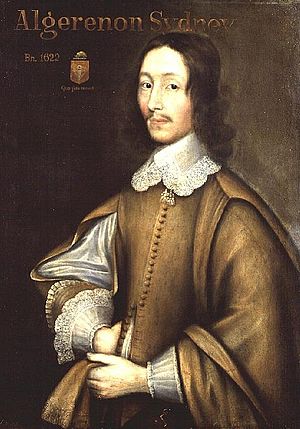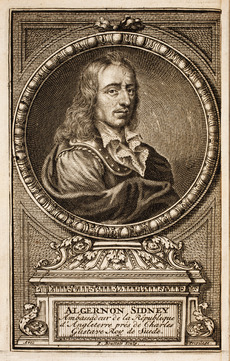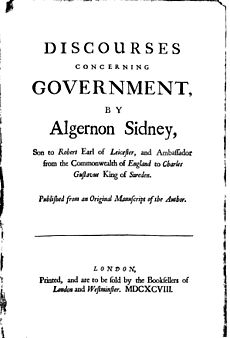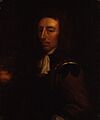Algernon Sidney facts for kids
Quick facts for kids
Algernon Sidney
|
|
|---|---|

Sidney in 1647
|
|
| Born | 15 January 1623 Baynard's Castle, London, England
|
| Died | December 7, 1683 (aged 60) Tower Hill, London, England
|
| Era | 17th-century philosophy (Modern philosophy) |
| Region | Western philosophy |
| School | Republicanism |
|
Main interests
|
Political philosophy |
|
Notable ideas
|
That individuals have the right to choose their own form of government and that, if that government became corrupt, the people retained the power to abolish it and form another |
|
Influenced
|
|
Algernon Sidney (born January 15, 1623 – died December 7, 1683) was an English politician and writer. He was a colonel in the army and believed strongly in a government where people had power, not just a king.
Sidney was involved in important events during his time, like the trial of King Charles I of England. He was later accused of planning against King Charles II of England. His most famous book, Discourses Concerning Government, was even used against him in court. He was put to death for his beliefs.
After his death, Algernon Sidney became known as a hero for freedom. His ideas, along with those of John Locke, helped shape modern thinking about government. His book, Discourses Concerning Government, argued that people have the right to choose their leaders. It also said that if a government becomes unfair, people can change it. These ideas were very important for the Glorious Revolution in England and the founding of the United States.
Contents
Early Life and Family
Algernon Sidney was born in London at Baynard's Castle. He grew up at Penshurst Place in Kent. His father was Robert Sidney, 2nd Earl of Leicester, and his mother was Dorothy Percy. His mother once wrote that he was praised for his "huge deall of witt and much sweetness of nature."
Fighting for Change
The English Civil War
Even though he once said he would only fight if absolutely necessary, Sidney joined the army. He became a lieutenant colonel and fought bravely in the Battle of Marston Moor in 1644. He was even wounded, which was seen as a sign of his courage.
In 1645, Sidney was elected to the Long Parliament. He was against making deals with King Charles I of England. He was part of the group that tried the king, but he didn't agree with executing him. He thought it wasn't lawful or wise.
Later, Sidney changed his mind about the king's execution. He called it "the justest and bravest act" ever done in England.
Opposing Cromwell
In 1653, Oliver Cromwell used his army to close Parliament. Sidney refused to leave until he was forced out. He saw Cromwell as a ruler who took too much power. Sidney even performed in a play called Julius Caesar, playing the role of Brutus, a character who fought against a powerful ruler.
A Diplomat for England
Peace in the Baltic Sea
After Cromwell died in 1658, Parliament was brought back, and Sidney returned. In 1659, he was part of a group sent to help make peace between Denmark and Sweden. This war was a problem for England's naval supplies.
Sidney was known for being direct. He told the Swedish king, Charles X Gustav of Sweden, that England would use its navy if needed to make peace. The king was angry, but Sidney stood firm.
Eventually, a peace treaty was signed in 1660. During this time, Sidney wrote a famous phrase in a visitor's book: "This hand, enemy to tyrants, by the sword seeks peace with liberty." This quote later became part of the Great Seal of Massachusetts during the American Revolutionary War.
Life in Exile
When the monarchy was brought back in England in 1660, Sidney was abroad. Because he had supported the king's execution, he decided to stay in exile. He lived in places like Rome and Geneva.
He faced danger during his exile, including assassination attempts. In 1666, he was in Paris and talked with King Louis XIV of France. Sidney hoped to get support for an uprising in England, but Louis XIV was cautious. Sidney stayed in France until 1677.
Court Maxims
While in exile, Sidney wrote a book called Court Maxims. In it, he argued that having a king was the "worst evil that can befall a nation." He believed that a republic, where people had more power, would be better for England. This book was not published until much later, in 1996.
Return to England and Trial
Political Troubles
Sidney returned to England in 1677. He became involved in politics again, working against those he saw as corrupt. He believed that the royal family and another powerful family were too closely linked.
Sidney joined others who were worried about the king's growing power. He was later linked to the Rye House Plot, which was a plan to harm King Charles II and his brother.
Trial and Execution
In June 1683, Sidney was arrested. His writings, including a draft of his Discourses Concerning Government, were taken. He was put on trial in November 1683.
The law usually required two witnesses for a treason charge. Since there was only one person who testified against him, the government used his book, Discourses Concerning Government, as the "second witness." The judge said, "to write is to act," meaning his ideas were considered a crime.
Sidney was found guilty of treason and sentenced to death. He asked the king for mercy, but it was denied.
On December 7, 1683, Algernon Sidney was executed. On the scaffold, he argued that his conviction was unfair. He said his writings were not treason and that he was dying for the "Good Old Cause," meaning the cause of liberty and good government. His remains were buried at Penshurst.
Discourses Concerning Government
Algernon Sidney strongly believed that a king having all the power was wrong. His book, Discourses Concerning Government, was written to argue against the idea of the "divine right of kings." This was a belief that a king's power came directly from God, and he could do whatever he wanted. Under this system, people often faced unfair treatment for their beliefs. Sidney was completely against this.
His book, published in 1698 after his death, explained his ideas for a fair government:
- People Choose Government: Sidney believed that people have the right to choose their own type of government. He wrote, "God leaves to man the choice of forms in government ... He who institutes, may also abrogate." This means if people create a government, they can also change it.
- Government Needs Consent: He argued that a fair government must be formed with the agreement of everyone. He said, "General consent ... is the ground of all just governments."
- Limited Government Power: Sidney also thought that government should have limited power. Its main goals should be to provide justice through courts and keep citizens safe. If a government fails at these basic tasks, people are no longer required to obey it.
Sidney's Discourses Concerning Government, along with John Locke's Two Treatises on Government, were very important for the founding of the United States. The people who created the United States, like Thomas Jefferson, studied these books. Discourses Concerning Government has even been called the "textbook of the American Revolution."
Legacy and Influence
After his death, Algernon Sidney was seen as a hero who died for his country and for freedom. His ideas were very influential in Britain and America in the 1700s. Many people believed his Discourses were even more important than John Locke's writings for a time.
The poet James Thomson praised Sidney as a "British Cassius," a hero who loved freedom.
Sidney's ideas had a big impact on how Americans thought about liberty. He was a hero to writers like John Trenchard and Thomas Gordon, whose essays, Cato's Letters, were widely read. These essays supported Sidney's idea that "free men always have the right to resist tyrannical government."
Thomas Jefferson believed Sidney and Locke were the two main sources for the ideas of the Founding Fathers about liberty.
The college Hampden–Sydney College in Virginia is partly named after Algernon Sidney because of how his ideas shaped the American Revolution. The name "Sidney" also became a popular first name in the United States after the American Revolution, showing how much people admired him as a symbol of freedom.
Works
- Sidney, Algernon: Discourses Concerning Government (London, 1698, and later editions);
- Sidney, Algernon: Apology in the Day of His Death;
- Sidney, Algernon: The Administration and the Opposition. Addressed to the Citizens of New-Hampshire (Concord, Jacob B. Moore, 1826, ASIN B000IUQ14Q)
- Sidney, Algernon: Algernon Sidneys Betrachtungen über Regierungsformen (Leipzig, Weygand, 1793: German translation of Discourses Concerning Government)
- Sidney, Algernon: Discourses Concerning Government, ed. Thomas G. West (Indianapolis, 1996, ISBN: 0865971420)
- Sidney, Algernon: Court Maxims, Cambridge University Press, in series Cambridge Texts in the History of Political Thought, 1996, ISBN: 978-0521461757)
- Sidney, Algernon: Discourses on Government. To Which is Added, An Account of the Author's Life (The Lawbook Exchange, New York, 2002 reprint, ISBN: 1584772093)
See also: Published literature from and about Algernon Sidney.
Images for kids
-
Copy of a 1663 portrait of Sidney by Justus van Egmont (National Portrait Gallery, London)
 | Claudette Colvin |
 | Myrlie Evers-Williams |
 | Alberta Odell Jones |






